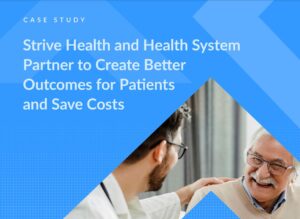Closing the Gap: How Strive Is Connecting CKD Patients with Nephrology Care
Muhammad Sohaib, Regional Medical Director and Natasha Dave, Regional Medical DirectorNephrologists can play a critical role in improving outcomes for patients with advanced kidney disease. Studies indicate and our experience shows that patients who are treated by a nephrologist before the onset of end-stage kidney disease (ESKD) have decreased mortality, lower risk of cardiovascular morbidity and mortality and lower blood pressure1-3. We also find that these patients tend to make a smoother transition to dialysis and have a higher probability of surviving the crucial first year of treatment.
Nephrology care not only improves clinical outcomes, but also reduces costs. By easing patients toward dialysis treatment, nephrologists can decrease complications and unplanned dialysis starts, which have been shown to be 67% more costly than planned starts due to associated hospitalizations.
Unfortunately, some patients don’t see a nephrologist before reaching ESKD. The reasons for this are numerous: lack of insurance, lack of health care access, lack of engagement with their primary care physician, lack of coordination among primary care and nephrologists, and perhaps, most commonly, a lack of awareness about kidney disease. The National Kidney Foundation reports that 1 in 2 people with very low kidney function don’t know they have kidney disease.
The Solution: Launch a targeted, multipronged program to improve the gap in nephrology care with the goal of improving patient outcomes. Strive’s Expanding Nephrology Access program focused on a group of patients with stage 4 and stage 5 chronic kidney disease (CKD) enrolled in our Kidney Heroes™ program in the Southeastern U.S. We targeted patients who had no nephrologist visits on record or none within the last 12 months.
Based on that criterion, we discovered that 76% of the patients enrolled in our program were eligible for nephrology intervention4. We also relied on guidelines established by KDIGO (Kidney Disease Improving Global Outcomes) to ensure that the patients targeted for nephrology referrals had a reason to be seen by one.
The Result: Over a 12-month period, Strive closed the nephrology gap for 92% of the 478 patients who qualified for the program4. That means that we referred 440 patients to nephrologists and confirmed that they were seen for a visit.
These results demonstrate that with a concerted effort, we can overcome the barriers that can prevent CKD patients from connecting with a nephrologist.
How We Did It — Key Components:
- Risk stratification to identify patients ready for nephrologist referral. Identifying the right patient at the right time is a crucial part of the process. Our risk stratification model helps us zero in on the patients who could benefit most from intervention, by examining a variety of information, including medical conditions, medications, lab results, healthcare usage, behavioral health, demographics and social determinants of health. We also incorporate predictive analysis to determine the risk of kidney failure, as well as other conditions, including heart attack or stroke, since cardiovascular issues are common among kidney patients. This data allows us to make a strong case for nephrology referral.
- Better coordination with primary care physicians: PCPs are key partners in the Expanding Nephrology Access program. For starters, we equip primary care physicians – who may typically rely on anecdotal information – with the evidence they need to make an educated referral to a nephrologist. Our CareMultiplier™ technology platform aggregates data from hundreds of sources, giving PCPs a holistic view of the patient. We also know that some patients feel more comfortable with their PCPs, which places those providers in a perfect position to educate patients about the value of seeing a nephrologist.
- Patient education and outreach/follow-up: Making a referral to a nephrologist is only part of the solution. Our Kidney Heroes™ – a team of nurse practitioners, nutritionists, social workers, care coordinators, nurse case managers, social workers and medical assistants – follow up with patients to ensure that they make and keep appointments with their nephrologist. To keep patients engaged, they perform regular outreach, educating patients about kidney disease and how other conditions, such as diabetes and high-blood pressure could impact their prognosis. They also inform patients about the consequences of failing to see a nephrologist and work with patients to overcome the obstacles – such as access to care – that might prevent them from seeing a nephrologist.
Conclusion:
Patients with advanced CKD often require specialized care. Nephrologists are key to improving the quality of care these patients receive and controlling costs for this complex population. Through risk stratification, better coordination with existing primary care providers and increased patient outreach, Strive has been able to connect chronic kidney disease patients with nephrologists. Our Expanding Nephrology Access program is one component of Strive’s model to engage and support CKD patients throughout their journey and help delay progression to more complex and costly care.
Sources
- Wang LY, Yin DX, Zhang DL, Xu R, Cui WY, Liu WH. Improvement and influencing factors of blood pressure control by nephrologist referral in chronic kidney disease patients in China: a cohort study. Int Urol Nephrol. 2013 Oct;45(5):1345-53. doi: 10.1007/s11255-012-0332-8. Epub 2012 Dec 7. PMID: 23225078.
- Caro Martínez A, Olry de Labry Lima A, Muñoz Terol JM, Mendoza García ÓJ, Remón Rodríguez C, García Mochón L, Castro de la Nuez P, Aresté Fosalba N. Optimal start in dialysis shows increased survival in patients with chronic kidney disease. PLoS One. 2019 Jul 30;14(7):e0219037
- Jankowski J, Floege J, Fliser D, Böhm M, Marx N. Cardiovascular Disease in Chronic Kidney Disease: Pathophysiological Insights and Therapeutic Options. Circulation. 2021 Mar 16;143(11):1157-1172. doi: 10.1161/CIRCULATIONAHA.120.050686. Epub 2021 Mar 15. PMID: 33720773; PMCID: PMC7969169.
- Metrics based on implementation of Strive Health’s Expanding Nephrology Access program in a single market. Focused on CKD 4 and 5 patients enrolled in the Kidney Hero program who had no nephrologist, or no nephrology visit, on record for the previous 12 months. Upon enrollment, 76% of 629 CKD 4/5 patients in this population (4789 patients) qualified for the Expanding Nephrology Access program. In the following 12 months, Strive confirmed that 92%, or 440 patients, of that group had seen a nephologist.





